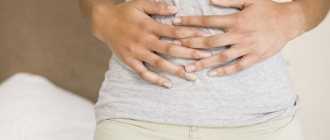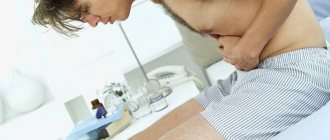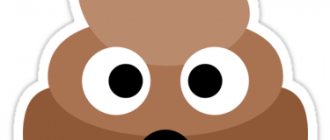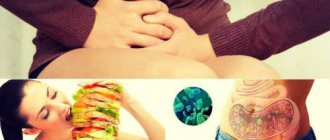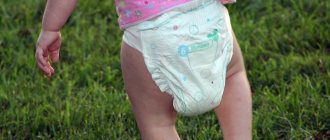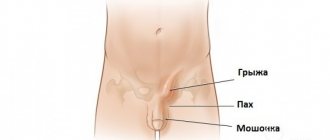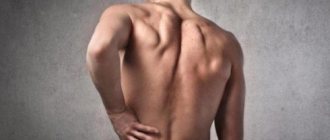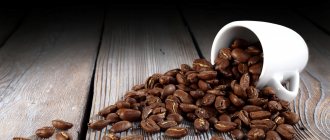Coprolite is stool that has hardened in the intestines and does not pass out naturally. Coprostasis is retention of feces in the rectum due to prolonged constipation. Performing enemas on your own or using laxatives during coprolitus can lead to injury to the rectum. The proctologist will solve the problem in one step and carefully remove the resulting coprolite. But the disease is prone to frequent relapses if the patient does not change his lifestyle and adjust his diet and bowel movements.
Why is coprolite formed?
Coprolite is formed if there is no regular bowel movement schedule. Feces stagnate in the folds and bends of the rectum, gradually thickening and turning to stone. In women, pathology occurs more often than in men due to constant hormonal changes. Other causes of coprostasis:
- dysbacteriosis;
- intestinal neurosis;
- infections and inflammations in the rectum;
- cholecystitis;
- pathological enlargement of intestinal sections;
- peptic ulcer;
- diabetes;
- problems of the reproductive system of women;
- haemorrhoids;
- neurological pathologies;
- disorders of the cardiovascular system.
Causes of stool in adults
Adult patients face the problem due to a combination of physiological and psychological conditions. The main cause is disturbances in the autonomic system that maintain the tone of the rectum and anus. In such patients, the Valva effect is disrupted, which in a normal situation begins the emptying of the ampulla located in the area of the sigmoid colon.
The pressure in the area increases, causing tension in the glottis and abdominal wall. If pathology is present, the interaction is disrupted. The patient loses control of the bowel movement. Calomania can occur at any age. A high risk accompanies the impairment of neurological connections and control of muscle tone that occurs with age. The problem can also be caused by pathologies that disrupt the functioning of the nervous system, losing connection with the muscle tissue in the area of the rectum and anus. Common causes include previous calectomy (intestinal surgery) and muscle weakness caused by habitual constipation. Pathology can lead to depression.
As concomitant symptoms can be caused by ischemic or hemorrhagic stroke, Alzheimer's disease and some other neurological diagnoses.
Symptoms and complications
Coprostasis is diagnosed if there is no stool for two days. Or bowel movements occur sparingly, irregularly, with difficulty. The disease is accompanied by flatulence and sometimes pain. With prolonged coprostasis, chronic intoxication begins. The patient experiences dizziness, fatigue, and headaches. The skin turns pale.
Fecal plugs injure the intestinal mucosa and provoke other proctological problems - hemorrhoids, anal fissures, rectal prolapse. Liquid feces may leak around the coprolite, which is then referred to as paradoxical diarrhea.
Against the background of coprostasis, a life-threatening condition can occur - intestinal obstruction. The patient begins to vomit uncontrollably, and cramping pain appears in the abdomen. In this case, urgent hospitalization and surgical intervention are required.
Steatorrhea (fatty stool)
Steatorrhea
- increased excretion of fats from the body in feces. With steatorrhea, the feces have an oily, greasy sheen and are difficult to wash off with water. A patient is considered to have steatorrhea if they lose 15 g of fecal fat per day or more. The norm is 7 g per day.
There are 3 types of steatorrhea:
- Type 1 steatorrhea is characterized by the presence of neutral fat in the stool
- Type 2 - the presence of fatty acids, soaps
- Type 3 steatorrhea combines symptoms of types 1 and 2.
Steatorrhea is one of the important clinical signs of exocrine pancreatic insufficiency, however, the presence of steatorrhea does not always indicate a disease of the pancreas; other causes are also possible.
One of the most serious causes of steatorrhea can be celiac disease, a disease of a genetic nature in which the absorption of gluten (gluten) is impaired.
The main direction in the treatment of patients with steatorrhea, especially if it is impossible to eliminate the causes of their development, is replacement therapy with enzyme preparations. About 150 years ago, the Dutch doctor D. Flesch used an aqueous extract from the pancreas of calves to treat steatorrhea in a patient with diabetes mellitus, but many aspects of the use of enzyme preparations still remain controversial (Kostyukevich O.I.).
For most patients with impaired exocrine pancreatic function, taking enzyme preparations with meals is quite sufficient to eliminate steatorrhea. However, in case of steatorrhea of extrapancreatic origin (giardiasis, celiac disease, excessive microbial contamination of the small intestine), replacement therapy with enzyme preparations is ineffective (Kalinin A.V.).
Steatorrhea can result from taking certain medications. In particular, the drug for the treatment of obesity orlistat (trade names: Alli, Xenalten, Xenical, Orlimax, Orlistat, Orsoten, Orsoten slim).
Publications for healthcare professionals regarding steatorrhea
- Sablin O.A., Grinevich V.B., Uspensky Yu.P., Ratnikov V.A. Functional diagnostics in gastroenterology. Educational and methodological manual. – St. Petersburg. – 2002. – 88 p.
- Bayarmaa N., Okhlobystin A.V. The use of digestive enzymes in gastroenterological practice // RMJ. – 2001. – volume 9. – No. 13–14. - With. 598–601.
- Kalinin A.V. Disorders of cavity digestion and its drug correction // Clinical perspectives in gastroenterology and hepatology. – 2001. – No. 3. - With. 21–25.
- Sviridova A.V. Features of diagnosis and treatment of exocrine pancreatic insufficiency in patients with various forms of chronic pancreatitis. Abstract of dissertation. Ph.D., 01/14/04-ext. diseases. MGMSU, Moscow, 2011.
- Maev I.V., Samsonov A.A. Chronic duodenitis (Algorithm for diagnosis and treatment tactics) / Manual for general practitioners, therapists, gastroenterologists: Textbook. - M: GOU VUNMTs MH and SR RF, 2007. 80 p.
- Maev I.V., Kucheryavyi Yu.A., Andreev D.N., Dicheva D.T., Gurtovenko I.Yu., Baeva T.A. Chronic pancreatitis: new approaches to diagnosis and therapy / Educational manual for doctors. M.: FKUZ "GKG Ministry of Internal Affairs of Russia". 2014. 32 p.
Patient Materials
The GastroScan.ru website contains materials for patients on various aspects of gastroenterology:
- “Advice from doctors” in the “Patients” section of the site
- “Popular gastroenterology” in the “Literature” section
- “Popular gastroenterology” in the “Video” section
Back to section
Diagnosis of fecal stones
The proctologist will take an anamnesis and palpate the abdomen and rectum. He will prescribe a series of tests: blood and urine tests, coprogram. Sometimes hardware diagnostics are required: gastroscopy, colonoscopy, MRI, CT, ultrasonography of the gastrointestinal tract, sigmoidoscopy.
It is quite easy to determine the presence of coprolite at the first appointment. It is more difficult to understand the causes of the problem and eliminate its root. Coprostasis often becomes chronic. To prevent relapses, it is necessary to cure concomitant diseases and change lifestyle.
Causes of the syndrome
Incomplete bowel movement occurs due to hormonal dysfunctions.
The syndrome described in this article can occur for many (including purely psychological) reasons. Among them:
- nervous shocks or stress (especially against the background of general increased excitability, suspiciousness or hypochondria);
- injuries to internal organs related to the gastrointestinal tract;
- previous infections of the digestive system (usually accompanied by dysbacteriosis);
- hormonal dysfunctions and related diseases (diabetes mellitus, overweight, hypothyroidism, as well as premenstrual syndrome and menopause);
- gynecological diseases that affect the reflex aspect of the activity of the intestines and other organs of the gastrointestinal tract;
- violations (often systematic) of the daily routine and, in particular, the diet (this can also include a lack of fiber in the patient’s usual diet);
- low physical activity (sedentary activity);
- “unsuccessful” heredity;
- advanced age of the patient.
Due to the complexity of the nature of the disease itself, its effective treatment is only possible with an integrated approach and patient monitoring by several specialists at once, in particular a proctologist, gastroenterologist and psychologist (sometimes a neurologist).
At the same time, the treatment methods themselves must be selected by physicians individually, in accordance with the general clinical picture of the disease and the severity of its most pronounced symptoms.
How to remove coprolite
A proctologist will help you get rid of discomfort in one visit. The procedure is quick and rarely requires pain relief. The doctor works carefully with his finger or auxiliary instruments. Removal steps:
- The patient undresses below the waist and lies sideways on the couch.
- The proctologist generously applies a special lubricant to the anus area.
- The doctor puts on gloves, treats the finger with lubricant and carefully removes parts of the fecal stone. If necessary, he helps himself with a sterile instrument.
- After the procedure, the proctologist will make sure that the rectal mucosa is not damaged, there is no bleeding, and the patient feels well.
- A specialist will advise you on how to avoid relapse. If required, he will refer you to a gastroenterologist and nutritionist.
Treatment of calomania
In the absence of causes caused by underlying diseases, various traditional methods can be used in therapy. The main goal of therapy is to strengthen the immune system and normalize the patient’s nutrition.
Treatment of calomania in children
In the treatment of pathology in children, the determining factor is the normalization of the psychosomatic state. Adults must first remove the child’s fear of potential violations. The child should not be scolded for “stained panties” in order to relieve sphincter dysfunction.
After confirming the diagnosis, parents should:
- in the first five days, forcefully cleanse the intestines; you can use laxative herbal teas or enemas;
- normalize nutrition by introducing an increased amount of vegetables;
- increase the amount of drinking, facilitating the washing of stool;
- put your baby on the potty more often;
- if there are cracks in the anus, apply lubrication with medicinal ointments;
- perform exercises for squeezing and unclenching the anal ring;
- maintain a calm atmosphere in the family.
The pathology most often goes away on its own within a few days.
Treatment of calomania in adults
It is important for adults not to skip the process of defecation when there is an urge. It is also important to normalize your diet by including a large amount of foods containing coarse fiber. Laxative medications and food products are used. For example, steamed prunes and beets.
If the pathology is caused by the main diagnosis, additional consultation with the attending physician is required.
Involuntary spotting
In some cases, the cause of “missed feces” is a complete lack of control over the process of defecation. In most cases, it is caused by neurological disorders that interfere with the connection of nerve endings to the rectum and muscles. In such a situation, the patient completely loses control of the process of conscious defecation. During the period of violation, the use of diapers is recommended.
Another reason for involuntary excretion of feces is a serious intestinal disorder with diarrhea, which can be eliminated with medication, which allows you to remove the acute stage in a short time.
Prevention of coprostasis
It is important to cure concomitant proctological diseases. Women should visit an endocrinologist. To improve bowel movements and maintain intestinal flora, you need to follow the advice of a gastroenterologist. In some cases, doctors prescribe laxatives, cleansing enemas, and therapeutic massage.
It is necessary to reconsider your lifestyle. Walk more, quit bad habits, drink a lot of clean water. Meals should be frequent, small portions. It is necessary to introduce cereals, vegetables, and fermented milk products into the diet. If you have other chronic diseases, you should discuss the diet with your doctor.
Experienced proctologists and gastroenterologists will provide medical assistance to you. The specialist will carefully remove the coprolite, find out the reasons for its formation and draw up a plan for restoring intestinal function to prevent constipation and relapses of coprostasis.
About the diagnosis of incomplete bowel movement syndrome
The reason for the feeling of incomplete emptying may be poor nutrition.
Incomplete bowel movement syndrome can be diagnosed using special medical tests.
However, before receiving a referral for such an examination from your attending physician, the patient must independently exclude the possibility of having other diseases that have similar symptoms.
In particular, often the cause of digestive dysfunction is poor nutrition or excessive consumption of so-called “food irritants” (caffeine, excessively fatty or spicy foods, etc.). For this reason, before an examination designed to identify incomplete bowel movement syndrome, the patient is put on a strict diet:
- Completely exclude products that cause increased gas formation. These include flour and most vegetables (for example, cabbage).
- Limit the use of certain medications (antibiotics, laxatives, as well as drugs enriched with potassium and iron).
- Products characterized by a high fiber content (some cereals, fruits, wheat bran) are introduced into the diet.
- They are changing their approach to cooking. In particular, the patient should give preference to steamed dishes (especially when it comes to fish or meat).
- Prescribe fractional meals (regular, but in small portions).
- It is recommended to give up the usual drinks (teas, lemonades, alcohol, etc.), giving preference to non-carbonated mineral water.
If the diet does not bring the desired results (the patient still feels discomfort during or after defecation) and the diagnosis of “incomplete bowel movement syndrome” is previously confirmed, the patient, to clarify it, is prescribed the following examinations:
- standard stool analysis;
- blood biochemistry study;
- irrigoscopy (in other words, an X-ray of the intestine filled with a contrast agent);
- colonoscopy (visual examination of the intestines using special equipment);
- sigmoidoscopy (or endoscope examination).
If the described comprehensive examination confirms a disappointing diagnosis, the patient is immediately prescribed comprehensive treatment.
How to wash off poop?
So, the time has come to take measures to flush away feces. Let's think about how to do it to increase the likelihood of flushing the poop the first time. After you've done your job and wiped your ass, throw the toilet paper so that it covers the shit. There is no need to wash it off right away, give it time to get wet. While you can pull up your pants. When the paper gets wet, it will become heavier and will sink your boat a little, and when the water is drained, more pressure will be created, which will push it into the pipe. And the paper, in turn, will prevent it from floating up. Thus, in a storm of water, the poop will get entangled in the paper, and it will pull it along with it. If it doesn’t work out the first time, try again. Place the paper in an even layer over the swimmer and wait a little, then wash off. This should help. This method is also applicable to cases when you have problems with the flush tank.
If absolutely nothing, then you can resort to more stringent measures. A toilet brush and the same toilet paper will help us here. Throw a layer of toilet paper over the floating shit again and use a brush to push it deeper, then rinse it off. Why throw paper if we shove it with a brush? If you don't do this, there will be bits of feces left on the bristles of this device, or you will simply end up stringing poop onto the bristles. This method can come to your aid in all three cases when you cannot wash off the shit.
Now you know how not to get into trouble and can act competently in a stressful situation. There are many extraordinary cases in life from which you need to quickly get out of them. On our website you can always find a lot of useful tips on this matter. We wish you success in the fight against indelible shit. Relief!
Method 2 of 4 Assess the color of the stool
Look closely at it, sniff it, study the contents - and draw useful conclusions. So I work in your provincial town as a sewer man... But I came to tell you that yesterday I began to notice that you no longer need my help... Each column contains two numbers: the number of views and the number of visitors.
The article states that it’s normal to be a “sinker.” In my experience, it’s the other way around: if I switch to an unhealthy diet, I become a “sinker,” but usually I become a “floater.” Vegetarians would you consider the "ideal" stool (that is, one uncontaminated by the consumption of animal parts) to be a Floater. Many vegetarians have spent their entire lives searching to produce perfection - when in fact no special diet can reliably produce Floats.
Causes of semi-liquid stools
- intestinal infections (food poisoning, dysbacteriosis)
- inflammatory diseases of the digestive system (hepatitis, pancreatitis, cholecystitis, cholelithiasis, enterocolitis, Crohn's disease)
- irritable bowel syndrome - increased passage of food bolus through the intestinal tube
- allergic reaction to medications or foods
- enzyme deficiency (lack of lactase to digest milk)
- stress and physical strain
- consumption of raw water and food unusual for the body
You should not look for and eliminate the cause yourself - the disease will progress. It is better to immediately contact an experienced gastroenterologist and get professional medical help. In our clinic you will find a sensitive attitude, an individual and comprehensive approach, convenience and comfort, which contributes to effective examination and treatment.
The act of defecation
Each organism is characterized by an individual frequency of bowel movements. Normally, this is from three times a day to three bowel movements a week. Ideally - once a day. Many factors affect our intestinal motility, and this should not be a cause for concern. Travel, nervous tension, diet, taking certain medications, illness, surgery, childbirth, physical activity, sleep, hormonal changes - all this can be reflected in our stool.
It is worth paying attention to how the act of defecation occurs. If excessive efforts are made, this indicates certain problems in the body.
Method 2 of 4 Assess the color of the stool
Look closely at it, sniff it, study the contents - and draw useful conclusions. So I work in your provincial town as a sewer man... But I came to tell you that yesterday I began to notice that you no longer need my help... Each column contains two numbers: the number of views and the number of visitors.
The article states that it’s normal to be a “sinker.” In my experience, it’s the other way around: if I switch to an unhealthy diet, I become a “sinker,” but usually I become a “floater.” Vegetarians would you consider the "ideal" stool (that is, one uncontaminated by the consumption of animal parts) to be a Floater. Many vegetarians have spent their entire lives searching to produce perfection - when in fact no special diet can reliably produce Floats.
Diet features
For spastic constipation, limit foods and dishes that irritate the mucous membranes of the gastrointestinal tract. These include:
- vegetables rich in essential oils: radishes, garlic, onions, etc.;
- smoked meats, marinades, salty foods;
- pepper dishes and spices;
- fried, fatty foods;
- baked goods, soda, strong coffee and tea, etc.
The diet can be developed individually, taking into account the needs and general health of a person.
The basis of the daily diet can be cereals, low-fat fish, meat, and poultry. It is important to eat first courses - soups with low-fat broth. Fresh vegetables and fruits are good for constipation because they contain a lot of dietary fiber. But you should monitor your condition and intestinal reaction, especially if you are already taking additional fiber.
Mousses, fermented milk products, dried fruits, and cottage cheese casseroles are suitable as desserts. You should avoid confectionery, chocolate, cocoa, and baked goods.
Bread should be chosen from wholemeal flour. Fresh white bread is prohibited; small amounts of day-old bread are allowed. Rusks can make the problem worse.
